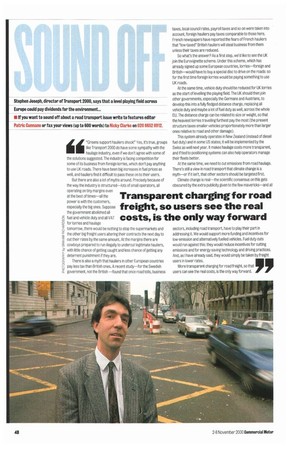d 4 1 ; k G e r eTer Transport s s p u o p r p t support o h 0 a u d l o i e h r
Page 50

If you've noticed an error in this article please click here to report it so we can fix it.
sa vs eh ocs 0 krfireYseysm, ii 'ast thcu we i tgroups d 41; kGer eTer Transport sspuoprpt support oh0a udloi ehr sa vs eh ocs 0 krfireYseysm, ii 'ast thcu we
haulage industry, even if we don't agree with some of the solutions suggested. The industry is facing competition for some of its business from foreign lorries, which don't pay anything to use UK roads. There have been big increases in fuel prices as well, and hauliers find it difficult to pass these on to their users.
But there are also a lot of myths around. Precisely because of the way the industry is structured—lots of small operators, al! operating on tiny margins even at the best of times—ail the power is with the customers, especially the big ones. Suppose the government abolished all fuel and vehicle duty and all VAT for lorries and haulage tomorrow, there would be nothing to stop the supermarkets and the other big freight users altering their contracts the next day to cut their rates by the same amount. At the margins there are cowboys prepared to run illegally to undercut legitimate hauliers, with little chance of getting caught and less chance of getting any deterrent punishment if they are.
There is also a myth that hauliers in other European countries pay less tax than British ones. A recent study—for the Swedish government, not the British —found that once road tolls, business taxes, local council rates, payroll taxes and so on were taken into account, foreign hauliers pay taxes comparable to those here. French newspapers have reported the fears of French hauliers that "low-taxed" British haulers will steal business from them unless their taxes are reduced.
So what's the answer? As a first step, we'd like to see the UK join the Eurovignette scheme. Under this scheme, which has already signed up some European countries, lorries—foreign and British—would have to buy a special disc to drive on the roads: so for the first time foreign lorries would be paying something to use UK roads.
At the same time, vehicle duty should be reduced for UK lorries as the start of levelling the playing field. The UK should then join other governments, especially the Germans and Austrians, to develop this into a fully fledged distance charge, replacing all vehicle duty and maybe a lot of fuel duty as well, across the whole EU_ The distance charge can be related to size or weight, so that the heaviest lorries travelling furthest pay the most (the present structure taxes smaller vehicles proportionately more than larger ones relative to road and other damage).
This system already operates in New Zealand (instead of diesel fuel duty) and in some US states; it will be implemented by the Swiss as well next year. It makes haulage costs more transparent, and if tied to positioning systems can also help operators manage their fleets better.
At the same time, we need to cut emissions from road haulage. There's still a view in road transport that climate change is a myth—or if it isn't, that other sectors should be targeted first.
Climate change is real—the scientific consensus on this gets obscured by the extra publicity given to the few mavericks—and all sectors, including road transport, have to play their part in addressing it. We would support more funding and incentives for low-emission and alternatively fuelled vehicles. Fuel duty cuts would run against this: they would reduce incentives for cutting emissions and for energy-saving technology and driving practices. And. as! have already said, they would simply be taken by freight users in lower rates.
More transparent charging for road freight, so that users can see the real costs, is the only way forward.












































































































